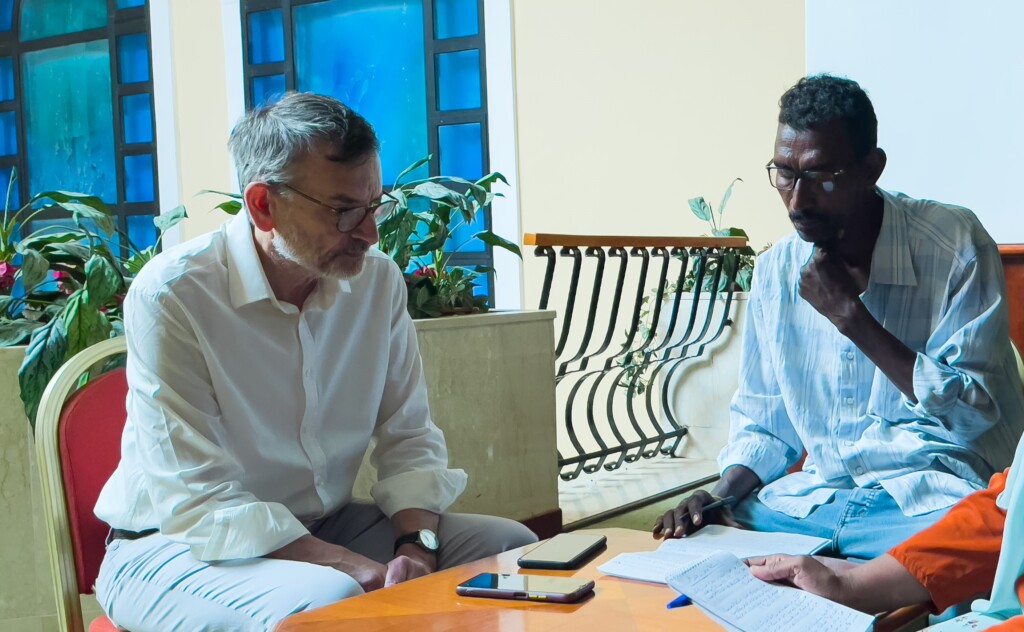UNITAMS head: ‘Quick military fix not an option in Sudan’

Volker Perthes, head of UNITAMS, interviewd by Radio Dabanga in Port Sudan today (Photo: RD)
PORT SUDAN –
Volker Perthes, Special Representative of the Secretary-General and Head of the United Nations Integrated Transition Assistance Mission in Sudan (UNITAMS), told Radio Dabanga from Port Sudan today that a quick military settlement for the Sudan conflict is out of the question.
In an interview in Port Sudan with Radio Dabanga, Perthes says that during the first week of the war, both the Sudan Armed Forces (SAF) and the paramilitary Rapid Support Forces (RSF), were counting on a military solution. However, as the clashes enter their second month, “the two sides have reached the conviction that a quick military settlement is out of the question”.
Perthes confirms that he is in constant communication with both parties to the conflict, including Commander-in-Chief of the (SAF) and Chairman of the Sovereignty Council, Lt Gen Abdelfattah El Burhan, and RSF leader Lt Gen Mohamed ‘Hemedti’ Dagalo.
‘Even if you have a military victory after a long battle, this may lead to the loss of the country’ – Volker Perthes
Addressing them directly in the broadcast, Perthes says: “Even if you have a military victory after a long battle, this may lead to the loss of the country.”
He stresses that resolving the conflict through negotiation is the clear preference of the Sudanese public, the United Nations, and the international community.
Referring to the Jedda talks, co-brokered by the USA and Saudi Arabia, Perthes says that they are military and tactical, and will not in themselves lead to a lasting ceasefire. He held both parties responsible for violating the previous ceasefires and humanitarian truces, and he stressed “the need to agree on an effective monitoring mechanism with participation of regional and international organisations”.
Perthes says that the participation of private citizens and Sudanese civil society will be necessary to observe any ceasefire on the ground, while he suggests that “certain countries will be able to monitor the ceasefire via satellite”.
He underlines that the achievement is the priority for his mission and its international partners, and most Sudanese civilians, but acknowledges that neither the SAF nor the RSF are likely to welcome the introduction of foreign monitors.
Perthes confirms that the UNITAMS headquarters in Khartoum were looted during the conflict, but he refused to apportion blame to any party. He does stress that “the authorities charged with protecting the sites on which our facilities are located are responsible for protecting them”. He laments that many UN warehouses in Khartoum and Darfur have also been looted.
In today’s interview with Radio Dabanga, Perthes condemns the killing of innocent people, the targeting of hospitals and residential areas, the indiscriminate shelling of residential areas, the use of health facilities as a refuge for fighters, and the looting of diplomatic facilities.
‘Unwanted presence’
He says that the mission considers the military presence within cities and in residential neighbourhoods undesirable, stressing the need “for fighters to withdraw from health facilities and all public service facilities for water and electricity”.
In terms of the way forward, Perthes says that “the Framework aAgreement remains, but needs to be looked at afresh… we do not expect that the political talks to start directly at the point at which they ended before on April 15”.
Perthes: “Any efforts to return the country to a stable political path and political understandings will not be based on soldiers and combatants, but on civilians,” and that the participation of the military or not in a future government is up to the Sudanese.
He downplayed the demands for his expulsion from the country, and considered the demands of Lt Gen Yasir El Ata to replace him with another envoy, as “his own opinion” and says “the government is interested in the presence of the United Nations in the country, including the mission”.
Perthes told Radio Dabanga that a delegation from the United Nations Office for Humanitarian Affairs (OCHA) will participate in the talks starting this week defining the details of the humanitarian ceasefire. The delegation will work to determine what is required of UN agencies and international NGOs for an effective supply of humanitarian aid to the affected people.
Addis Ababa
He says that he will travel to the Ethiopian capital of Addis Ababa on Friday to coordinate with the African Union (AU) under the umbrella of the AU-IGAD-UN Trilateral Mechanism. He says that the deputy humanitarian coordinator of the UN in Sudan may visit Chad or neighbouring countries to study the logistical possibilities of delivering aid to Darfur.
Regarding requests by the governor of the Darfur region and the governors of the states with UNITAMS to send medicines and aid by air to El Fasher in North Darfur and Nyala in South Darfur, he said that the UN agencies are concerned with considering the request if it is officially received. He stressed that such an operation must be coordination with Sudanese authorities at various levels, including the governor of the Darfur region.
Perthes concludes the interview with Radio Dabanga saying that he has agreed with Sudan’s Minister of Finance Jibril Ibrahim and the Red Sea state government, to see that humanitarian aid that reaches the country is distributed to all states, adding that the priorities in eastern Sudan are related to water and the displaced.











 and then
and then